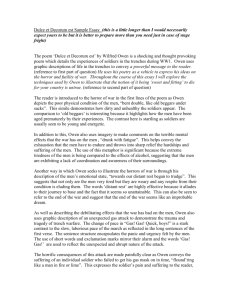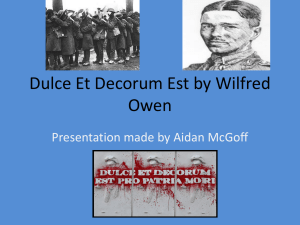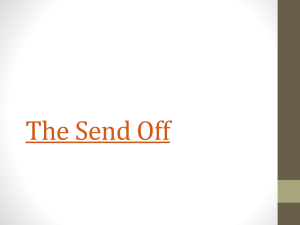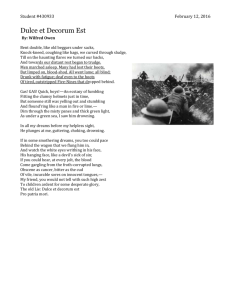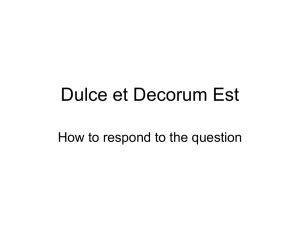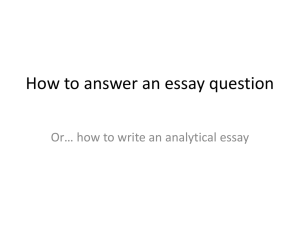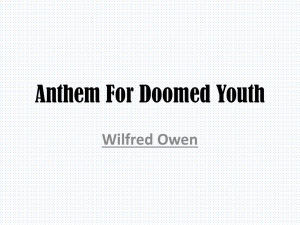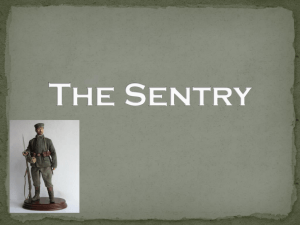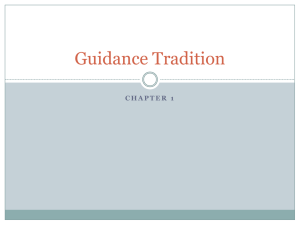Dulce et Decorum Est: Poem Analysis & Essay
advertisement
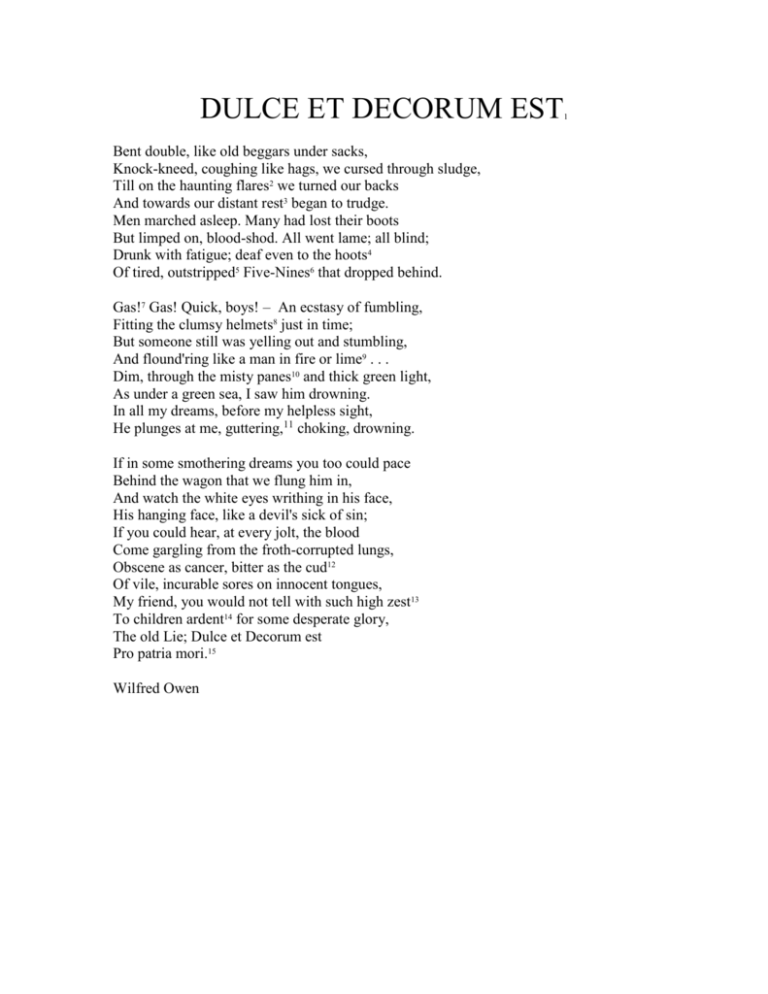
DULCE ET DECORUM EST Bent double, like old beggars under sacks, Knock-kneed, coughing like hags, we cursed through sludge, Till on the haunting flares2 we turned our backs And towards our distant rest3 began to trudge. Men marched asleep. Many had lost their boots But limped on, blood-shod. All went lame; all blind; Drunk with fatigue; deaf even to the hoots4 Of tired, outstripped5 Five-Nines6 that dropped behind. Gas!7 Gas! Quick, boys! – An ecstasy of fumbling, Fitting the clumsy helmets8 just in time; But someone still was yelling out and stumbling, And flound'ring like a man in fire or lime9 . . . Dim, through the misty panes10 and thick green light, As under a green sea, I saw him drowning. In all my dreams, before my helpless sight, He plunges at me, guttering,11 choking, drowning. If in some smothering dreams you too could pace Behind the wagon that we flung him in, And watch the white eyes writhing in his face, His hanging face, like a devil's sick of sin; If you could hear, at every jolt, the blood Come gargling from the froth-corrupted lungs, Obscene as cancer, bitter as the cud12 Of vile, incurable sores on innocent tongues, My friend, you would not tell with such high zest13 To children ardent14 for some desperate glory, The old Lie; Dulce et Decorum est Pro patria mori.15 Wilfred Owen 1 1 DULCE ET DECORUM EST - the first words of a Latin saying (taken from an ode by Horace). The words were widely understood and often quoted at the start of the First World War. They mean "It is sweet and right." The full saying ends the poem: Dulce et decorum est pro patria mori - it is sweet and right to die for your country. In other words, it is a wonderful and great honour to fight and die for your country 2 rockets which were sent up to burn with a brilliant glare to light up men and other targets in the area between the front lines (See illustration, page 118 of Out in the Dark.) 3 a camp away from the front line where exhausted soldiers might rest for a few days, or longer 4 the noise made by the shells rushing through the air 5 outpaced, the soldiers have struggled beyond the reach of these shells which are now falling behind them as they struggle away from the scene of battle 6 Five-Nines - 5.9 calibre explosive shells 7 poison gas. From the symptoms it would appear to be chlorine or phosgene gas. The filling of the lungs with fluid had the same effects as when a person drowned 8 the early name for gas masks 9 a white chalky substance which can burn live tissue 10 the glass in the eyepieces of the gas masks 11 Owen probably meant flickering out like a candle or gurgling like water draining down a gutter, referring to the sounds in the throat of the choking man, or it might be a sound partly like stuttering and partly like gurgling 12 normally the regurgitated grass that cows chew; here a similar looking material was issuing from the soldier's mouth 13 high zest - idealistic enthusiasm, keenly believing in the rightness of the idea 14 keen 15 see note 1 UNDERSTANDING Read the poem carefully and make a note of any new/unfamiliar vocabulary and find the definitions in the dictionary. Read the poem again and construct some notes for yourself under the heading WHAT WHERE WHEN of the poem. WHO WHY to help you identify the situation or story Once you have done this, you will be asked to use your notes to summarise the narrative of the poem. Taking each verse of the poem in turn, give it a heading and write brief notes on the subject of that section. e.g Section One lines 1-8 ‘Weary journey’ In this section, Owen vividly describes the... THEN COPY AND COMPLETE THE FOLLOWING TABLE Point Section one (lines 1-8) Description of the soldiers marching back to base. Section Two (lines 9-16) Description of the gas attack and the poet’s nightmares about the incident Section Three (lines 17-28) Description of the suffering of one particular soldier leading up to the moral or message of the poem. Owen shows physical suffering of men Owen shows mental suffering of men Owen creates a sense of panic Owen communicates his feelings of guilt Owen highlights the horror of war for the reader Owen reinforces his moral message Quotations Annotation Section 1 (lines 1-8) Description of the soldier's marching back to base 'bent double' - weighted down by heavy equipment. War has quite literally brought them to their knees. 'like old beggars' - simile suggesting how dirty, unhealthy and malnourished the men are and old before their time 'coughing like hags' simile reinforces idea of premature ageing and degradation. HAG old, unattractive woman trudge - slow, heavy sounding word, reflecting how slowly they move and how each step is an effort 'blood shod' - horrific image - feet are encrusted with blood where they have lost their boots 'we' - first person indicates personal experience 'drunk with fatigue' - metaphor comparing mental effects of exhaustion to that of alcohol blind/deaf - refer to effects of war/exhaustion e.g dulls senses and makes them slow to react long sentences reflect laborious pace of march Section 2 (lines 9-14) Horror of a gas attack Gas! Gas! - change of pace. Short words and exclamation marks used to stress urgency. 'ecstasy of fumbling' - note contrast, almost an oxymoron 'ecstasy' usually refers to state of high excitement. fitting/stumbling/floundering - PRESENT PARTICIPLES denote ongoing state rather than action, process perhaps continued for some time. Suggest futility/helplessness of their situation. 'like a man in fire or lime' - simile illustrating agony of man/also could refer to how he moves as he chokes 'as under a green sea' - green of gas/looking through masks? man is literally drowning in gas/can't breath, also indicates vast nature of gass - it surrounds him/traps him ellipsis (...) suggests process went on for some time Section 3 (lines 15-16) The poet's nightmares about the incident note that the lines are laid out separately to add to impact poet reflects on incident and relives it in his dreams 'guttering' - onomatopoeiac in that it evokes sounds made by dying man 'helpless sight' - transferred epiphet emphasises his inability to help at the time and now he is forced to relive the horror over and over Section 4 (lines 17-28) Moral message of poem 'you' use of second person addresses reader directly. whole verse structured as one sentence ladinf to climax in last four lines 'flung' word choice - violent act, no time for compassion or ceremony. Harsh reality of war. It brutalises and desensitises the men who fight 'watch the white eyes' - alliteration emphasises agony and horror of man's death 'like a Devil's...' - war is so cruel, Satan himself might turn away in revulsion emotive language - bitter, cancer, incurable etc expresses horror and futility of war. Also expressess poet's own emotions at enduring this Irony is used in the line 'my friend...' - scathing attack on stay at home patriots Dulce et Decorum est Sample Essay 'Choose a text with an important message. Briefly say what the important message is and go on to show how the writer is successful in communicating his/her ideas to you.' The poem ‘Dulce et Decorum est’ by Wilfred Owen is a shocking and thought provoking poem which details the experiences of soldiers in the trenches during WW1. Owen uses graphic descriptions of life in the trenches to convey a powerful message to the reader. (reference to first part of question) He uses his poetry as a vehicle to express his ideas on the horror and futility of war. Throughout the course of this essay I will explore the techniques used by Owen to illustrate that the notion of it being ‘sweet and fitting’ to die for your country is untrue. (reference to second part of question) The reader is introduced to the horror of war in the first lines of the poem as Owen depicts the poor physical condition of the men, “bent double, like old beggars under sacks”. This simile demonstrates how dirty and unhealthy the soldiers appear. The comparison to ‘old beggars’ is interesting because it highlights how the men have been aged prematurely by their experiences. The contrast here is startling as soldiers are usually seen to be young and energetic. In addition to this, Owen also uses imagery to make comments on the terrible mental effects that the war has on the men , “drunk with fatigue”. This helps convey the exhaustion that the men have to endure and throws into sharp relief the hardships and suffering of the men. The use of this metaphor is significant because the extreme tiredness of the men is being compared to the effects of alcohol, suggesting that the men are exhibiting a lack of coordination and awareness of their surroundings. Another way in which Owen seeks to illustrate the horrors of war is through his description of the men’s emotional state, “towards our distant rest began to trudge”. This suggests that not only are the men very tired but they are weary and any respite from their condition is eluding them. The words ‘distant rest’ are highly effective because it alludes to their journey to base and the fact that it seems so unattainable. This can also be seen to refer to the end of the war and suggest that the end of the war seems like an improbable dream. As well as describing the debilitating effects that the war has had on the men, Owen also uses graphic description of an unexpected gas attack to demonstrate the trauma and tragedy of trench warfare. The change of pace in “Gas! Gas! Quick, boys!” is a stark contrast to the slow, laborious pace of the march as reflected in the long sentences of the first verse. The sentence structure encapsulates the panic and urgency felt by the men. The use of short words and exclamation marks mirror their alarm and the words ‘Gas! Gas!’ are used to reflect the unexpected and abrupt nature of the attack. The horrific consequences of this attack are made painfully clear as Owen conveys the suffering of an individual soldier who failed to get his gas mask on in time, “flound’ring like a man in fire or lime”. This expresses the soldier’s pain and suffering to the reader, reminding them of the personal face of war through the torment of an individual man. This simile is extremely poignant as it highlights the extent of his distress and the use of ‘fire or lime’ compounds his torture as both are very vivid comparisons that allow the reader a glimpse of the agony that he is experiencing. As the poem progresses, Owen makes the far reaching effects of war abundantly clear by describing his own nightmares, “in all my dreams, before my helpless sight”. This line clearly demonstrates the brutal impact that war also has on the lives of those who survive and is very effective as it emphasises his torment as he has to relive the experience over and over in his dreams. The transferred epithet in ‘helpless sight’ communicates his frustration at the fact that he was unable to prevent his friend’s suffering at the time and now is reduced to being a passive observer. The poet strengthens his message in the last verse by emphasising the suffering of the soldier by referring to “the wagon that we flung him in”. This demonstrates the brutality of war and the desensitising nature of their experiences. The word ‘flung’ is shocking to the reader and inspires a profound emotional response because the word itself suggests a dismissive, violent action, indicating that there was no time for compassion or grief. It also suggests that this tragedy is commonplace and death has become just another part of life for the men, compounding the horror that is their day to day lives. Finally, the bitter irony of the poem is revealed in the last lines as he attacks those who would argue that death in war is glorious, “my friend, you would not tell with such high zest”. Here, Owen employs the use of second person to address the stay at home patriots and those who would encourage young men to give up their lives for their country. The use of ‘my friend’ is deeply ironic and betrays his anger as he holds these people accountable for what he and so many others has had to endure and claims that if only they were to witness the atrocities of war then they would realise the extent of the ‘old Lie’. The real irony of the poem, however, is in the title which Owen alludes to in the final line of his poem, “Dulce et Decorum est pro Patria Mori”. The reader now understands that this too is ironic. Instead of being a rousing and patriotic call to war, the poem is in fact the exact opposite. The use of ‘Dulce et Decorum est’ in the title is striking as the contrast between the patriotism of these lines and the graphic descriptions of the horrors of war encapsulates the disparity between the young recruits’ expectations and the realism of the war. In conclusion, the poem ‘Dulce et Decorum est’ by Wilfred Owen is a deeply poignant poem that uses a variety of powerful techniques to express a very powerful message. Through his descriptions of the physical, mental and emotional affects of war, Owen skilfully delivers a searing attack on those who would encourage young men to fight without understanding the real horrors of war. Owen seeks to shed light on these horrors and in doing so highlights the tragedy of innocent men who are misled into sacrificing their lives for their country.
